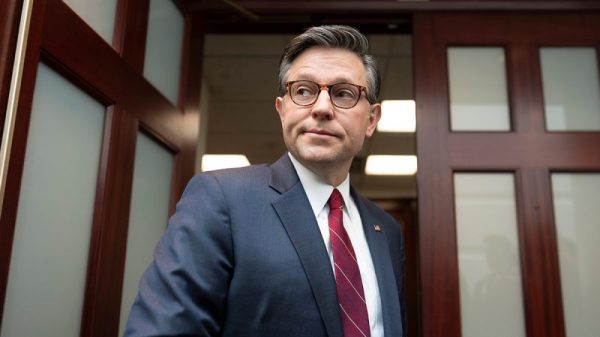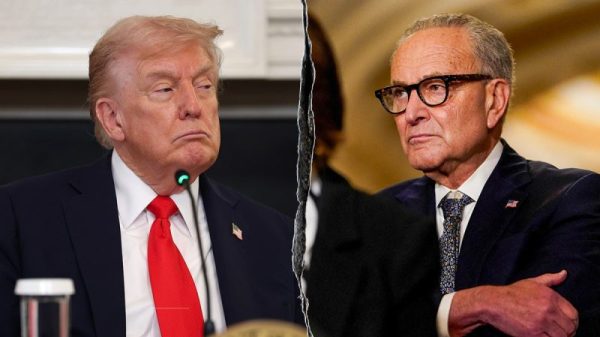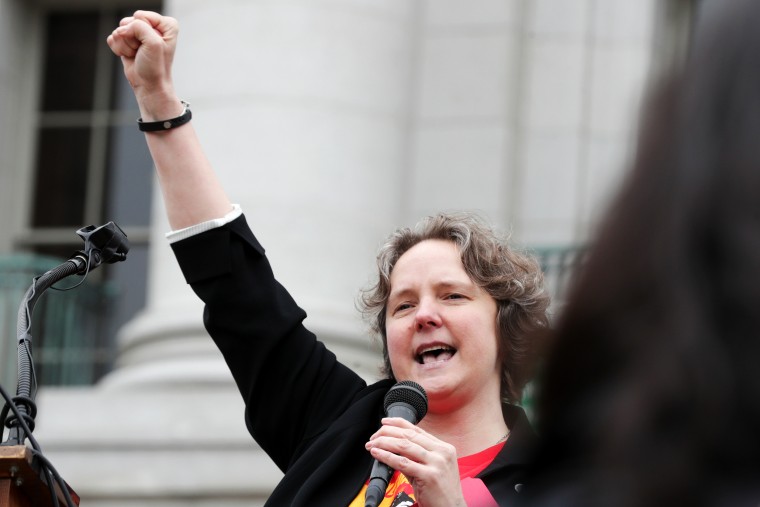Just weeks after Kiki Ramos received her first $500 monthly payment from the Richmond Resilience Initiative, her car was stolen.
“It would have been a big domino effect if I didn’t have this extra money,” she said.
Her damaged vehicle was soon recovered, but without the additional cash, the 33-year-old pharmacy technician couldn’t have afforded to get it fixed or secure a rental in the meantime, given her $1,000 insurance deductible. That would’ve meant figuring out car pools or public transportation to and from work, and little ability to shuttle her boys, ages 12 and 3, to doctor’s appointments and recreational activities.
Kiki Ramos.Courtesy Kiki Ramos
Ramos is one of 46 participants in a guaranteed income program now in its third iteration in Virginia’s capital, a city of around 230,000 people where 1 in 5 live in poverty. The initiative is one of 35 such programs running concurrently across the U.S., according to Mayors for a Guaranteed Income (MGI), a group of municipal leaders working to expand them.
The programs have been gaining steam in a post-pandemic economy whose resilience keeps defying expectations, even as high living costs squeeze working families. Proponents say the unconditional payments help cover gaps in a social safety net that lags behind millions of households’ financial realities. Critics, however, are renewing long-running arguments that the handouts discourage work in a still-humming job market.
Richmond’s initiative targets residents who work but still struggle to make ends meet. Ramos earns at least $42,000 per year, around $5,000 above the federal poverty line for a household her size. While her income disqualifies her for most state and federal benefits, it rarely covers her $1,200 monthly rent, $150 weekly grocery bill and car insurance payments that now total $680 each month.
It would have been a big domino effect if I didn’t have this extra money.
Kiki Ramos, 33, Richmond, Va.
“At certain points in my life, I was only like $10 or $50 over” the cutoff for the Supplemental Nutrition Assistance Program, said Ramos, who also supports her mother and sister, both of whom struggle with mental disabilities that prevent them from working. While they receive Medicaid, Ramos said her family has been denied SNAP and Section 8 housing benefits because of her salary.
“Knowing that I will never qualify for any type of assistance is extremely frustrating,” she said.
Richmond’s economy bounded out of the pandemic faster than the nation’s, its real gross domestic product jumping 2.6% from 2020 to 2022, the latest data available, compared with 1.9% nationally. Still, the United Way deems more than a third of Richmond-area families “ALICE” households — asset limited, income constrained, employed — whose incomes don’t consistently cover essentials despite their living above the poverty line.
As in other cities, Richmond’s ALICE households swelled during the pandemic, adding 21,000 from 2020 to 2021 alone. The health crisis marked a turning point for guaranteed income, or GI, programs, as federal stimulus payments proved “the government can make cash available to the vast majority of people pretty easily,” said Aditi Shrivastava, deputy director for income security at the Center on Budget and Policy Priorities, a left-leaning think tank.
Richmond recipients like Ramos “were essentially on a fiscal cliff every single month,” said Democratic Mayor Levar Stoney, who now wants to expand the program, with $500,000 in his 2025 budget proposal, to “allow us to get to even more families.”
Richmond Mayor Levar Stoney is pushing for $500,000 in public funding to extend the city’s guaranteed income program.Caroline Brehman / AP file
Stoney was elected in 2016 and joined MGI’s board in 2020. The consortium of mostly Democratic leaders has been using federal dollars — boosted by funding from 2021’s American Rescue Plan — along with private contributions, including from donors like Twitter co-founder Jack Dorsey, who now leads financial services firm Block, to back GI projects nationwide.
The group said it has overseen the launch of 66 such pilots in the last four years, including in red states like Kentucky and Florida. Unlike “universal basic income” proposals like the one championed by 2020 presidential candidate Andrew Yang, which aim to cover an entire population regardless of earnings, guaranteed income programs are typically restricted to those beneath certain income levels or who don’t have access to other benefits.
The concept has been around since at least the 1960s, when proponents ran the gamut from the Black Panther Party to Richard Nixon, though he rejected the GI label. It has regained attention in recent decades as policymakers responded to “constant crises” hammering consumer finances, especially during the last two recessions, according to Paul Shafer, an assistant professor of health law and policy at Boston University.
“I think there was just a recognition, even before then, that this patchwork isn’t quite working,” he said of existing safety-net programs like Medicaid, Social Security and SNAP. “There’s still lots of gaps in it.”
Michael Tubbs, MGI’s founder and the former mayor of Stockton, California, made waves before Covid hit when he launched a GI program in 2019 that gave 125 residents $500 a month. While the pandemic was found to have limited the initiative’s impact, Tubbs said it proved promising enough to inspire subsequent efforts, which Covid and the racial equity movement sparked by George Floyd’s murder helped propel further.
“This is not a radical notion anymore,” Tubbs said.
Not everyone agrees. Conservative groups that pushed back against pandemic-era aid programs are now taking aim at guaranteed income too.
Tarren Bragdon, the president and CEO of the Foundation for Government Accountability, a right-leaning think tank, criticized GI projects’ “slow creep,” saying a too-generous welfare state discourages people from working — a concern both parties shared until roughly the last decade. His group, which has sought to curtail access to safety-net programs through tighter employment requirements, has also rolled out messaging to counter GI efforts in some of the cities pursuing them.
“Policymakers should look for ways to expand opportunities for people to find meaningful work, not create more reliance on government budgets,” Bragdon said.
Some GI advocates say the programs do just that, helping recipients take advantage of the very job boom that opponents say obviates them.
A February report by the University of Pennsylvania’s Center for Guaranteed Income Research analyzed a program in Cambridge, Massachusetts, that gave $500 a month to single-caretaker households from 2021 to 2023. It found that within one year, 40% were working full time, compared to 28% of a control group.
Reviewing an 18-month pilot in St. Paul, Minnesota, from 2020 to 2022, the researchers found participants’ employment rate had hit 63% six months after the program ended, up from 49% when it began.
Taniquewa Brewster.Courtesy Taniquewa Brewster
In Austin, Texas, Taniquewa Brewster has been working to supplement her income since the 12-month GI pilot she participated in ended last fall. Anticipating the loss of her $1,000 monthly stipend, the 38-year-old contract laborer and single mother of five used some of the money to get certified as a real-estate leasing agent and a notary months before her last installment. She also started training as a doula.
“It basically helped me to stabilize my family,” said Brewster.
In February, following an Urban Institute study highlighting the Austin program’s successes — including participants’ investment in skills training — the city council announced plans to expand the pilot with $1.3 million in taxpayer funding. But this week, Texas Attorney General Ken Paxton, spurred by concerns from fellow Republicans, moved in the other direction, suing to challenge a Houston-area GI program he called a “socialist experiment” and an “illegal and illegitimate government overreach.”
Idaho Republicans passed a measure last month banning GI programs that don’t require work or training. Their counterparts in Iowa and Arizona have taken similar steps, though Democratic Gov. Katie Hobbs vetoed the latter. When Wisconsin’s GOP supermajority passed a ban on public funding for GI efforts — a bill targeting Madison, the state’s capital and its only city with a guaranteed income pilot — Democratic Gov. Tony Evers vetoed it.
Madison, Wis., Mayor Satya Rhodes-Conway hopes to sustain a 110-person guaranteed income program.Steve Apps / Wisconsin State Journal via AP file
“The idea that $500 a month would make somebody quit their job, I just feel like we’re not living in the same economy,” said Madison Mayor Satya Rhodes-Conway. The income threshold for Madison’s GI program, which finished its first cohort last fall, was set at 200% of the federal poverty level to cover those “just above being eligible for other benefits that still really need support,” she said.
Finding governmental support for the pilot has been ‘cumbersome,’ Rhodes-Conway said, “so I’m trying to support our local nonprofit community to take ownership and have the funds that they need” to keep the 110-person pilot alive.
The idea that $500 a month would make somebody quit their job, I just feel like we’re not living in the same economy.
Madison, Wis., Mayor Satya Rhodes-Conway
While some advocates now call for more ambitious GI programs — lasting five years, say, rather than one or two — the movement’s champions have already faced setbacks. After Tubbs’ high-profile re-election defeat in 2020, even progressive allies speculated whether his focus on the city’s GI program, which included just 125 participants, alienated voters who didn’t benefit from it.
But with more than 150 guaranteed or universal basic income pilots conducted or concluded in the U.S., according to a Stanford University tally, the momentum may be hard for opponents to arrest. More than 60% of Americans said they supported a national guaranteed income of $500 to $1,000 a month for adults earning less than their community’s median, according to a February survey commissioned by MGI.
More electoral tests are coming. In January, Stoney announced his candidacy for the 2025 gubernatorial election in Virginia, a swing state that in 2021 replaced its Democratic governor with Republican Glenn Youngkin.
“I’m going to be focused on how do we give the working class in this commonwealth a hand up,” Stoney said of his campaign. “Guaranteed income can be a useful tool for those who are working hard who just don’t qualify for the current federal benefit structure in this country.”
Next year will show whether voters agree.






















